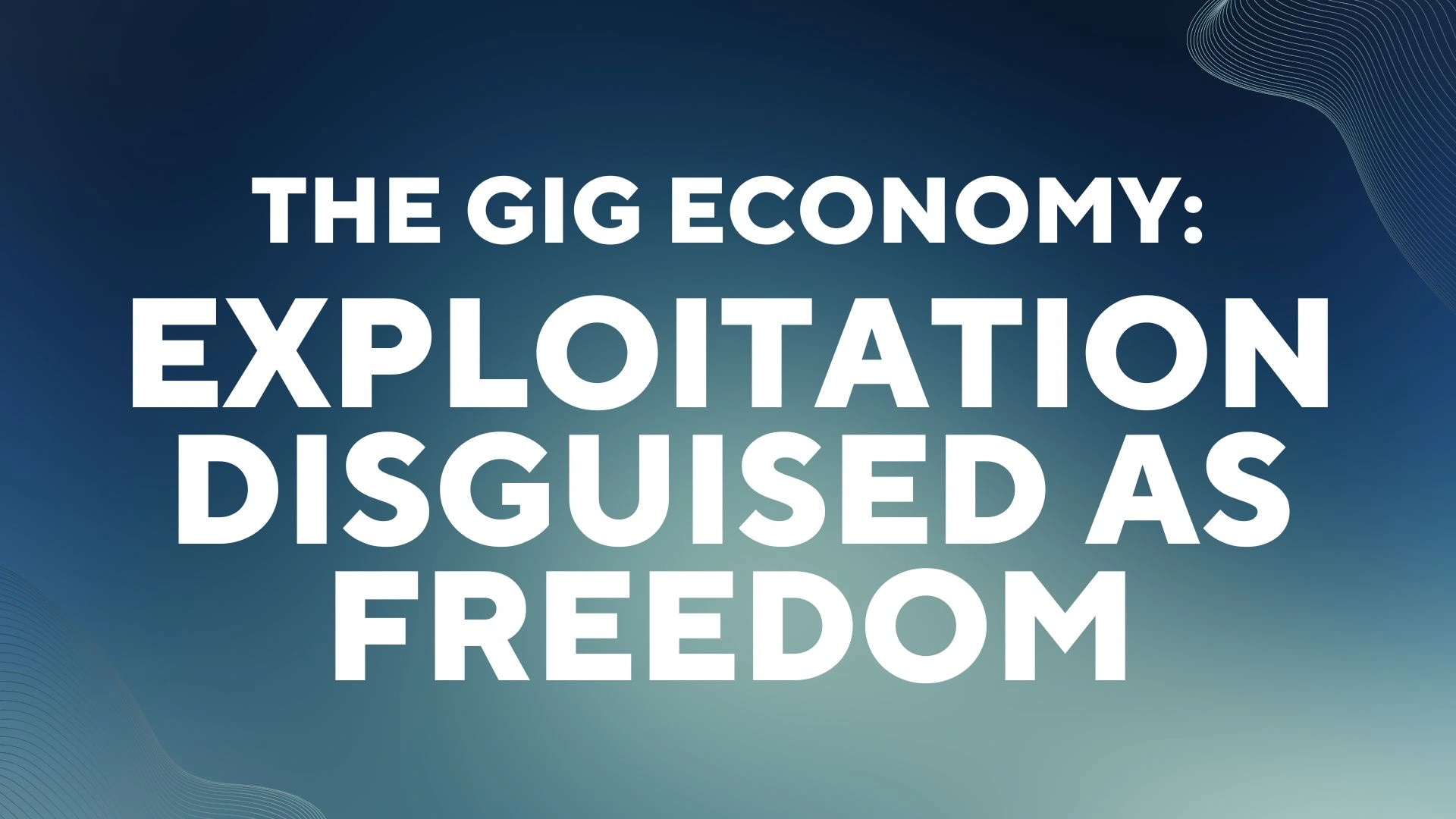Introduction: The Gig Economy
The gig economy has been marketed as a beacon of freedom—work whenever you want, wherever you want. But beneath the shiny promise of independence lies a stark reality: for many workers, gig work is just another form of modern exploitation. Companies save money by sidestepping labor laws, while workers struggle with unpredictable income, lack of benefits, and job insecurity.
What is the Gig Economy?
The gig economy refers to a labor market characterized by short-term, flexible jobs. Instead of traditional full-time employment, workers operate as independent contractors, picking up tasks as they become available. Companies like Uber, DoorDash, and Fiverr have capitalized on this model, boasting convenience for consumers and flexibility for workers.
The Allure of Flexibility
One of the biggest selling points of gig work is flexibility. Workers can choose their own hours, work around personal obligations, and theoretically, be their own boss. Sounds ideal, right?
The Reality of Instability
But here’s the catch—flexibility often comes at the cost of stability. Gig workers face income uncertainty, no health insurance, no paid time off, and no retirement plans. Their financial well-being is entirely at the mercy of fluctuating demand and opaque algorithmic decision-making.
1. The Myth of Being Your Own Boss
While gig workers are technically independent, many still function under company-imposed rules. Platforms control pricing, customer interactions, and even deactivate workers without warning. The notion of being your own boss quickly falls apart when you realize your livelihood depends on an unpredictable algorithm.
2. Lack of Benefits and Protections
Unlike traditional employees, gig workers are not entitled to paid leave, healthcare, or unemployment benefits. If a driver falls ill, they simply don’t get paid. If a freelancer loses clients, there’s no safety net.
3. Unpredictable Wages
Gig workers often don’t know how much they’ll make week to week. Algorithmic pay structures mean rates can fluctuate with no transparency, leaving workers scrambling to make ends meet.
Who Really Benefits?
1. Corporations Save Billions
By classifying workers as independent contractors, companies avoid paying minimum wage, overtime, or benefits, saving billions while workers bear the financial risks.
2. Consumers Enjoy Cheap Convenience
Gig services make life easier for consumers, but this convenience comes at a cost—low wages and job insecurity for workers.
3. The Rise of “Algorithmic Bosses”
Algorithms dictate how much workers earn, when they work, and even whether they stay employed. Unlike human managers, algorithms lack empathy, often making arbitrary decisions that impact livelihoods.
The Psychological Toll on Workers
Constant financial uncertainty, long hours, and a lack of job security take a mental toll on gig workers. Many report burnout, stress, and feelings of helplessness.
Efforts to Regulate the Gig Economy
1. Laws and Legislation
Some governments have started pushing back. California’s AB5 aimed to classify gig workers as employees, though legal battles have since diluted its impact.
2. Unionization Efforts
Workers are organizing to demand better pay, protections, and recognition as employees rather than independent contractors.
3. Ethical Business Models
Some companies are exploring fairer gig work models, offering benefits and transparent pay structures.
Conclusion: A System in Need of Reform
The gig economy is not inherently bad, but its current structure overwhelmingly benefits corporations at the expense of workers. Real freedom comes not just from flexibility, but from fair pay, job security, and access to benefits. Without reform, the gig economy will continue to be an exploitative system disguised as opportunity.
FAQs
1. Is the gig economy good or bad? It depends on perspective. While it offers flexibility, it often lacks stability, fair wages, and worker protections.
2. Can gig workers unionize? Yes, though companies often push back. Some worker-led initiatives are gaining traction in demanding better conditions.
3. Why don’t gig workers just get traditional jobs? Many do gig work due to necessity, lack of traditional job opportunities, or a need for flexible hours.
4. Are there any ethical gig platforms? Some companies offer better protections, but most gig work platforms prioritize cost-cutting over worker welfare.
5. What can consumers do to support gig workers? Tipping generously, advocating for fairer labor laws, and supporting ethical gig platforms can make a difference.
gig economy, freelance work, worker exploitation, labor rights, job flexibility, gig work pros and cons, independent contractor, fair wages, gig economy struggles, freelance job insecurity, gig work exploitation, digital labor concerns, side hustle myths




